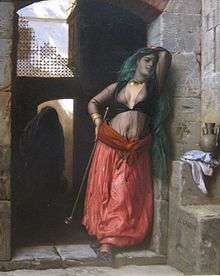Almah (Egyptian dancer)
Almah or Almeh (Egyptian Arabic: عالمة ʕálma IPA: [ˈʕælmæ], plural ʕawālim عوالم [ʕæˈwæːlem, -lɪm], from Arabic: علم ʻālima "to know, be learned")
was the name of a class of courtesans or female entertainers in Egypt, women educated to sing and recite classical poetry and to discourse wittily, connected to the qayna slave singers.[1]
They were educated girls of good social standing, trained in dancing, singing and poetry, present at festivals and entertainments, and hired as mourners at funerals.[2]
| This article is part of a series on |
| Life in Egypt |
|---|
 |
| Culture |
|
| Society |
|
| Politics |
|
| Economy |
|
Egypt portal |

The Awalim were first introduced as singers, not dancers-cum-prostitutes, according to Edward William Lane's book, Manner and Costumes of modern Egyptians. Lane additionally wrote that the Almah didn't display herself at all, but sang from behind a screen or from another room at weddings and other respectable festivities. Consequently, the Awalem were not subject to exile in Upper Egypt.[3]
In the 19th century, almeh came to be used as a synonym of ghawazi, the traditional erotic dancers of Egypt whose performances were banned in 1834 by Egypt's king Mohamed Ali. As a result of the ban, the ghawazi dancers were forced to pretend that they were in fact Awalim. Transliterated into French as almée, the term came to be synonymous with "belly dancer" in European Orientalism of the 19th Century.
Awalim
From the last decades of the 19th century until the 1920s, there were some of the most notable and last "awalim" of Egypt:[4]
- Shooq
- Bamba Kashar
- Chafika Al Qebtiya
- Mounira Al Mahdiya
- Badia Masabni
- Beba Ibrahim
- Nabawiya Al Masryia
References
- Stavros Stavrou Karayanni (2004). Dancing Fear and Desire: Race, Sexuality, and Imperial Politics in Middle Eastern Dance. Wilfrid Laurier University Press. pp. 28–29. ISBN 978-0-88920-926-8.
-

- Debating Orientalism, Anna Bernard, David Attwell., 13 June 2013, ISBN 9781137341112
- Cairo cafes: A century of music and coffee – Folk Arts – Folk – Ahram Online